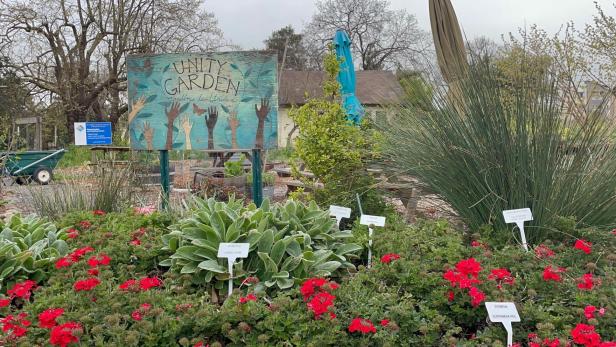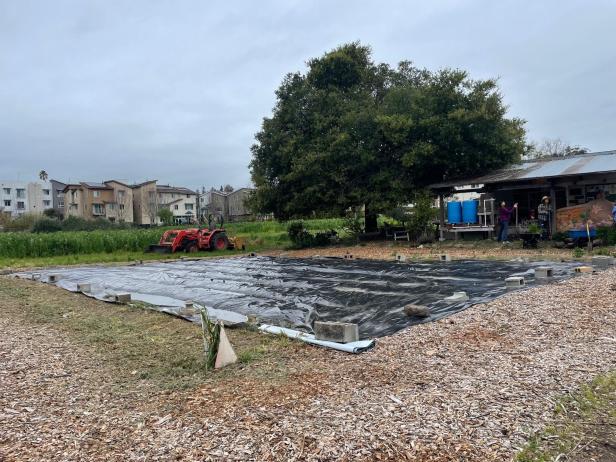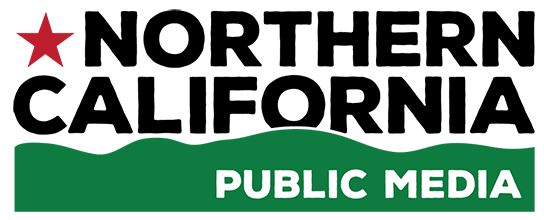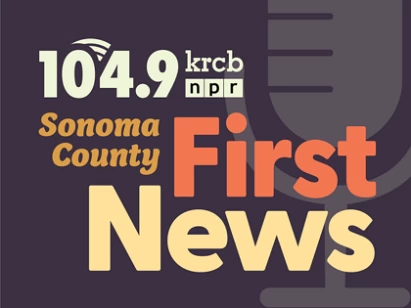 photo credit: Noah Abrams/KRCB
photo credit: Noah Abrams/KRCBThe Unity Garden at Petaluma Bounty on Shasta Avenue in Petaluma.
Agricultural heritage is a big part of Sonoma County’s identity - and especially Petaluma’s.
One farm remains committed to growing to
growing bountiful produce in the city itself.
One pair of hands behind it are those of Paul Martin.
"And that's the cover crop ahead of you," Martin said. "And that just basically puts nutrients back into the soil. We end up cutting it down."
That cover crop of beans, greens, grass, and rye, Martin is describing, grows full and thick over what will soon be rows of summer vegetables at Petaluma Bounty.
On the city's northwest side, it’s a community educational farm tucked into a quiet corner off Petaluma Boulevard between a group of apartments and the tracks of the SMART train.
Suzi Grady is the farm’s program director.
"Petaluma Bounty itself came out of a 2004 community needs assessment, a two year study of what the greatest unmet need in Petaluma was," Grady said. "Access to fresh fruits and vegetables, especially for children and seniors was the greatest unmet need."
A part of Petaluma People Services Center, Grady said the Bounty’s early programs, geared towards community gardens, came before the actual farm itself.
"In 2008, we started the Bounty Community Farm on land privately owned by the Stonitsch family," Grady said. "And we're still there and we are trying our darnedest to acquire that property."
The farm sits on the former Stonitsch & Arvold lumber mill site.
Now with the aid of a $2.1 million matching grant from Sonoma County Ag & Open Space, Grady said a fundraising campaign for the three-acre property is getting underway.
"Part of our fundraising is to pay for the property minus the commercial development value of that land," Grady said. "It's zoned for high density housing and that's why the cost of it is so high."
Despite the potential for housing development, Grady said she feels Petaluma Bounty, which borders multiple high rise apartments, is a needed part of the neighborhood.
"It's our belief that the larger community doesn't need another high density apartment complex," Grady said. "But what they do need is access to green spaces and access to high quality food grown right outside their door."
Besides Grady, Petaluma Bounty’s small staff includes Maria Wnorowski.
"I am the education and engagement coordinator/farmer's market ambassador coordinator, and basically what that means is any engagement and education opportunities happening on the farm," Wnorowski said. "So field trips, corporate events, I help with the coordination of all of that."
 photo credit: Noah Abrams/KRCB
photo credit: Noah Abrams/KRCBPlanting rows remain covered in late March through spring time rains at Petaluma Bounty.
Since Petaluma's Bounty's mission to make healthy food more affordable to everyone, it offers 30% discounts for limited income families and 50% discounts for CalFresh customers up to $10."
So how exactly do the veggies get into people’s hands? There’s a few avenues according to Wnorowski.
"We have three primary sales outlets," Wnorowski said. "Historically, we sell at our farm stand...and that's typically on Wednesday afternoons. And then we sell at the Petaluma Health Center, and then we sell at the Walnut Park Farmer's Market too, which is over in Petaluma."
Petaluma Bounty also provides farm shares - so called “Bounty Bags” - according to Wnorowski, and has begun a gleaning program to harvest unused fruit from residential backyards around Petaluma.
Besides a few Petaluma Bounty staffers, there are many volunteers who keep the farm running. Wnorowski said the Bounty brings in folks from all walks of life.
"We have a lot of young twenties and thirties people who like don't have kids, but just moved to Petaluma, moved back, and are looking for just a way to get to know people or just enjoy being outside," Wnorowski said. "And you can come once a month. You can come once every six months. You can come once a week. it's very flexible. And then we'll have parents with their kids come and then a lot of seniors."
The aforementioned Paul Martin is Petaluma Bounty’s longest serving volunteer, and as he noted, Petaluma Bounty’s first mission is of course, the vegetables.
"We're trying to get food out to people that just wouldn't be able to afford going to any of the supermarkets," Martin said.
According to Bounty program director Suzi Grady, growing vegetables isn’t the only way they try to be a good neighbor.
"It's been a few years, but we regularly invite community members, we flyer around the local housing and grocery stores and commercial places to have kind of like an open house," Grady said. "This is what the Bounty is offering. We ask them, are those relevant to you? What would make our programming more relevant?"
Grady said it’s part of a focus on solving food insecurity.
"What are the blocks and barriers between you and a healthier you, a healthier lifestyle for you? I believe strongly that people are the best experts of their lives and what they need in order to step toward wellness," Grady said. "But we're here to support them and to develop community solutions to the shortfalls of our conventional food system."
Wnorowski also helps Petaluma Bounty facilitate community programs, and equitable food access with farmers market ambassadors at 18 different farmers markets in Sonoma County.
On the education front, she said there’s actually been some unexpected shifts in the Bounty’s role recently.
"So many schools have school gardens, which is such an incredible opportunity of growth that's happened over the past decade," Wnorowski said.
The proliferation of school gardens was sparked in 1995 with chef Alice Waters' Edible Schoolyard project at MLK Jr. Middle School in Berkeley.
The expanding popularity of school gardens now means Wnorowski plans education programs for many students who have experienced gardening first hand.
"So how does coming out to a farm, like what makes that unique? And so how do we bring in this question of like food access and making food affordable and obviously have it be grade appropriate," Wnorowski said. "But have kids start to realize that like food costs money, and that can be a huge barrier for some people."
So what’s happening on the farm at the moment, Wrnowski said, "right now, the height of spring, we are in a big crunch for our plant sale and getting stuff in the ground."
"Come May and June, we'll be taking all of our plant starts and putting them in the ground," Wnorowski said. "And then June, July, August, September, October is always super fun. A lot of it's harvesting."
Petaluma Bounty is looking to purchase the three acre property they’ve leased since 2008, but with so many moving parts, starts, people, and vegetables on the farm, the fundraising campaign is still picking up steam.
Grady said the organization's current task is assembling a working group to guide the capital campaign, and ultimately, "to be able to have Petaluma's first urban farm be saved and maintained for forever," Grady said.
For Paul Martin, Petaluma Bounty’s still all about the simple things.
"This is hard work, you know?" Martin said. "I mean, it's very rewarding because you get to eat the vegetables, at least I do, you know? And then get the vegetables out to people who normally would not be able to afford organically growing vegetables and keep the prices reasonable, you know, which we do."
Petaluma Bounty's annual Spring Plant Sale runs Saturday, April 20th from 2-4:30 PM for mobility challenged, immunocompromised, and EBT customers; and from 9AM-3PM on Sunday, April 21st for the general public.

 Live Radio
Live Radio




